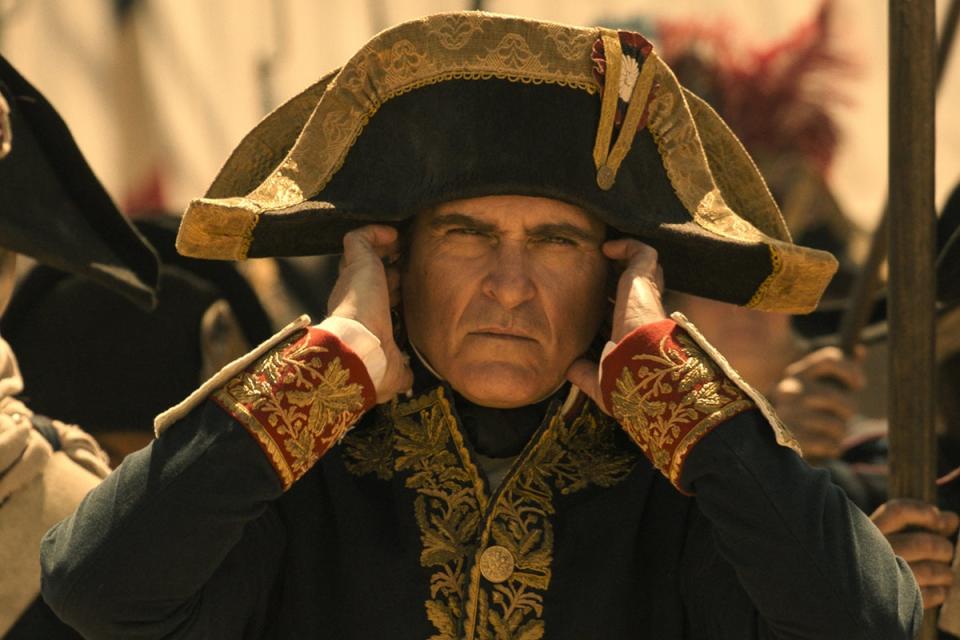Napoleon review: Joaquin Phoenix and Vanessa Kirby are perversely watchable in Ridley Scott’s thrilling epic
Napoleon Bonaparte was there, at the dawn of cinema – the subject of an 1897 short by Louis Lumière. In 1927, he occupied the mind of French filmmaker Abel Gance, whose 330-minute epic, one of the medium’s great technical achievements, was intended to be the first of six films on Napoleon’s life. And he’s continued, ever since, to frustrate cinema’s greats: Charlie Chaplin, Stanley Kubrick, and Steven Spielberg all dreamed of and failed to bring Napoleon to screen. His allure – a mire of genius, megalomania, and hubris – has proven irresistible to storytellers dedicated to capturing the endless contradictions of the human spirit.
Ridley Scott’s Napoleon, ultimately, has no real sense of the definitive to it. It’s a culmination, only, of the director’s own legacy as one of our finest storytellers and a formative auteur of pop culture. In short, it’s the life of Napoleon as only Scott can tell it, full of verve, spectacle, and machismo. Its battle scenes are thrilling, a throwback to the sort of spectacle no one in Hollywood – save, well, Ridley Scott – is interested in anymore. But it can be equally dispassionate, in a way that duly and accurately captures the man one contemporary described as “a chess master whose opponents happen to be the rest of humanity”.
It’s a dense bit of history to tell. We begin with a young Napoleon (Joaquin Phoenix), a Corsican lieutenant whose military acumen made him indispensable to the power-hungry men like Paul Barras (Tahar Rahim), who capitalised on the chaos that erupted out of France’s revolution. But Napoleon was able to carve out his path to the position of first consul, then emperor, and swept through Europe like a firestorm – only to find out, too late, and much like his hero Alexander the Great, that empires cannot sustain themselves on conquests alone. He was defeated at Waterloo, and then exiled by the British to St Helena, where he died six years later. It’s said that three million French men died for the sake of his follies.
Scott, here, adds bloody spectacle to this empire built on cannon fire. It’s a trademark of his historical work, from his debut, 1977’s The Duellists, up to 2021’s The Last Duel. And, in an effort to truncate so many notable events into one, two-and-a-half-hour film, he expresses a formidable efficiency in visual language. The brutality of a 19th-century battlefield is viewed from underneath the ice at Austerlitz, where 2,000 Russian soldiers were drowned by a few well-aimed cannon shots, or within the shuffle of British infantry into the square formations that fended off French cavalry at Waterloo.
He also, as others have done, lays much of Napoleon’s impenetrable psychology at the feet of his Empress, Joséphine de Beauharnais, brilliantly rendered by Vanessa Kirby as haughty, clever, and ingeniously manipulative. Nothing about their courtship is romantic, but it is perversely watchable – a romance between two sociopaths committed to the performance of love. The sex they have is brief, vulgar, and absurd. Napoleon’s idea of seduction is to whinny and stamp his feet like a horse.
Napoleon is a traditional, historical epic rendered in Scott’s own brawny, cannily modern style. David Scarpa’s script matches those ambitions, though it’s at its weakest when it bends to narrative convenience. Scott may be entirely within his rights to demand pesky fact-checkers “get a life”, but the way Napoleon’s legacy still shapes modern French political discourse doesn’t entirely exempt him from responsibility here. And, in the film’s rush to present Napoleon’s desire to conquer the world as a substitute for his inability to conquer his wife, it tends to overshadow the cruel and mechanical machine that drove his empire – the one that reintroduced slavery in the West Indies or oversaw the massacre at the siege of Jaffa, in the Ottoman Empire.
Yet, equally, you’d have to profoundly misread Scott’s Napoleon to walk away with the idea that he was anything but a tyrant, thanks largely to Phoenix’s reliable brilliance. His Napoleon is one of the finest in a long line of petulant baby men that can be traced back to his star-making turn as Emperor Commodus in Scott’s own Gladiator. It’s a performance that’s not only deeply convincing, magnetic in its ugliness, but canny in its approach – by lending a touch of arrested development to the man, he becomes an instantly recognisable brand of despot to modern audiences (hint hint, cough cough).

As Phoenix howls, scowls, and storms his way through Napoleon, you get a real sense that Scott has had his cake and eaten it. He gorges on the thrill of military victory that formed the centre of Napoleon’s propaganda campaign (including a perfect recreation of the Jacques-Louis David painting of his coronation, followed by a pan down to David himself at the canvas). And, yet, he’s able to throw up a middle finger at that same illusion. This won’t be the last word on Napoleon, certainly – but it’s a compelling one, at least.
Dir: Ridley Scott. Starring: Joaquin Phoenix, Vanessa Kirby, Tahar Rahim, Ben Miles, Ludivine Sagnier, Matthew Needham, Youssef Kerkour, édouard Philipponnat, Rupert Everett. 15, 157 minutes.
‘Napoleon’ is in cinemas from 22 November